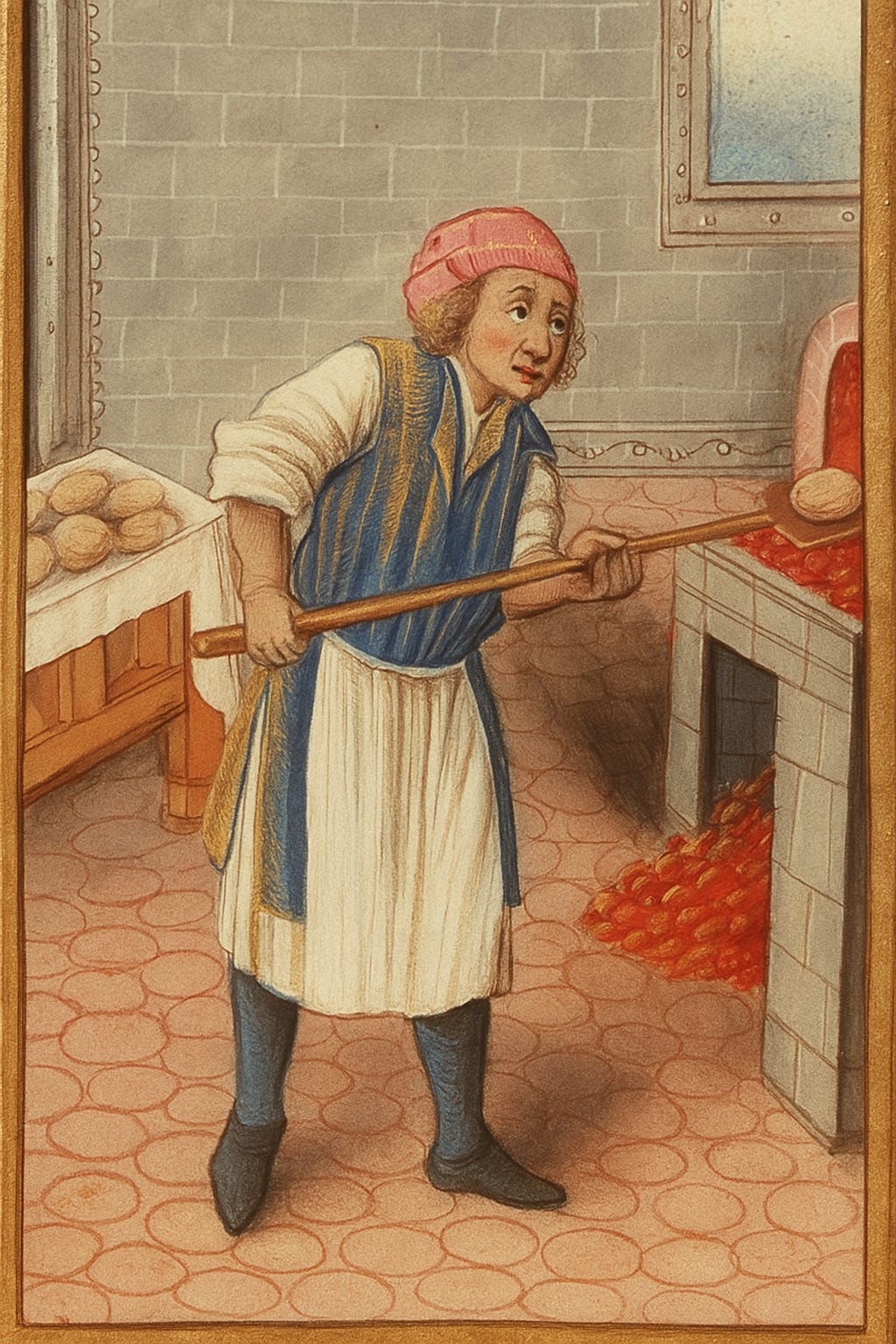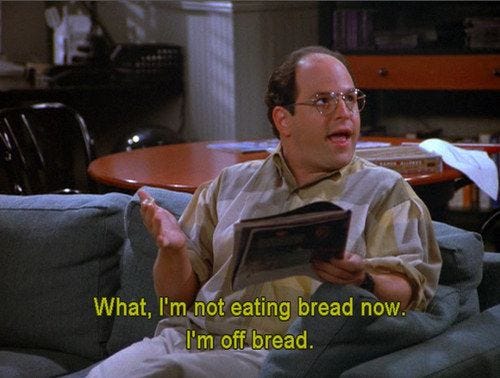I’m paying a lot of money for food that won’t kill me.
It sounds fake but bakeries in California charge $20 for a small loaf of bread (edit: OK, let’s make it more fair… it’s usually closer to $15). They take pride in their short and clean ingredient list: water, flour, salt, sourdough starter. So, I ask myself, what the fuck am I paying for then?
The typical answer is that I’m paying for my gut not to get wrecked. I’m literally paying money so I don’t get poisoned. I’m paying money so they don’t put chemicals in my bread. Just flour and water for me please, hold the dioxide-turbodeath-E12.
If you notice it once, you immediately realize that since the early 2000s, you’ve been living behind a paywall. In order to unlock all of the content of life1, you have to pay the price; unfortunately, it’s not always about money.
Normality Index
GDP increases, we’re all enjoying the technological progress and the abundance in consumer goods, and yet we’re making massive sacrifices daily on the level of the individual.2
Your food is a byproduct of a chemical experiment, your clothes are melted plastic, and you’re forced to play the corporate game or you’ll starve and become homeless.
This is a bleak image that everyone will argue doesn’t represent reality. And they’re right! You can make the right choices, buy the right products, avoid the common pitfalls and lead a decent life.
However, the effort, money, and commitment to achieve that modest goal have been steadily increasing over the last few decades. You need to spend more and more to keep up with the normality inflation. Even then, you don’t quite get what your father and grandfather got for a lot less. In fact, the majority of your resources will be exhausted in removing the obstacles that are designed to block your way toward the bare minimum.
From education and healthcare to nutrition and entertainment, you’re tasked to jump through hoops for the standard tier life. The normality index keeps increasing and you can’t keep up with it.
Everything requires permission, a slip from the government that allows you to exist on a basic level. Your social life is subsidized by social media companies. Landlords will charge you whatever they can get away with. Your entertainment is laced with insidious charges and slop quality. Your healthcare is a monstrous bureaucratic machine that automates you down to a statistical pulp, never getting what you actually need but what insurance companies optimize for profit. And “cheap” traveling entails 14 hours stuck in what was once a child’s safety seat. The worst part is that we can’t see it or don’t want to see it.
Going back to the bread example, the most common counterargument is that small, local businesses have to charge a lot because they can’t compete with the massive scale distribution of Big Bread. Which is exactly my point. The indirect monopoly that we allow to flourish either forces other companies into some Red Queen strategy or they have to spin their products in a way that captures a niche audience; you aren’t eating bread, you’re eating mitochondria-boosting sourdough bread made with deuterium-depleted volcanic water.
In essence, competition makes basic expectations “premium quality” and we accept it because we were taught to pull ourselves by the bootstraps, believing in a just-world where we must suffer in a disproportional way before we have the right to exist and be ok. If we work harder, surely we can afford all the goods so it won’t matter in the end, right?3
This pattern also influences our mental perception of the world. There’s a tendency to claim otherwise mundane experiences are magical or spiritual. Having a cup of coffee in the morning is nothing short of a religious experience. Eating a nutritious meal is euphoric. Spending the day outside will solve your existential crisis. We’re overexcited about things we used to take for granted. In doing so, we’re unconsciously trying to justify the price we paid to get them.
There is a place for normies but not normality
Normie is a dehumanizing label for someone who doesn’t frequent in digital shitholes and instead enjoys what life has to offer without questioning the status quo. Theoretically, they represent mentally stable individuals who are seamlessly integrated into society because their psychology is designed to do that.
What if the fit is perfect but the suture is infected?
The normie has the fate of the boiling frog. Every day, more and more is taken away from them. Their boundaries regress to fit the rate of degeneration in order to avoid the discomfort of facing reality; their modus operandi serves a palliative function.
The mistake is to assume that what normies do, how normies live, is normal. In the past, judging what constitutes a normal life by observing the average person was a valid strategy but if you adapt it to today, there’s a good chance you’ll boil to death before you realize what’s happening.
A few years ago, I was hungry. I also happened to be in Rome. It was noon and I’d been walking since dawn, just taking it all in, including multiple espressos and cigarettes.
I found a shop serving paninis near the Pantheon. I asked for the chef’s choice, which is basically half a pound of mortadella, fresh mozzarella, and a generous slab of pesto. It cost 7 euros. While South Europe has a host of other problems, when it comes to food they’re a testament to how we always had a choice between “normality” and recommodification/premiumization. Sure, it’s illegal to leave the A/C on during the summer but sourdough bread costs less than 3 euros in almost all bakeries.
I ask you, is it entitlement or it feels like entitlement because we’re divorced from our basic needs?4
Am I asking too much when I expect my food not to kill me and my tap water not to be filled with thousands of shredded credit cards and lead?
Do I really need to study basic chemistry and biology in order to have a heathy breakfast? Am I required to have a working knowledge of international geopolitics and economy before I fill up my tank?
The answer is yes. If you want to afford a normal life.
One Foot In, One Foot Out
I used to joke that if you do the opposite of what everyone thinks is good, you’re going to do everything right. Of course, that’s not entirely true. It’s more accurate to say that doing the opposite of what people tell you is “good” will lead to an interesting life, at the very least.
It’s in this spirit that I try cultivating a conscious relationship with society, without letting it drag me into unconsciousness or, better phrased, seamless integration. By no means am I promoting detachment. If anything, creating a stronger boundary will end up fostering a deeper connection to everyone around you since you’ll make choices instead of other people and institutes making choices for you.
But I hope you can see that this is an upstream solution that doesn’t rout out the fundamental problem. Worse, always striving to treat the individual, finding clever ways to patch things up and circumvent these challenges, highlights the mass scale of the situation — a situation we all share yet we continue to believe the diagnosis and treatment have to be individualized and in doing so, we isolate ourselves even more.
In many cases, people try to pay for the vanilla version of reality but unfortunately, the servers are unsupported…
Meditations on Moloch goes into greater detail.
System justification is a psychological mechanism that makes defending the system, even if it’s not in your best interests, appear like the best strategy.
I need to reiterate that I’m not trying to romanticize the past. There’s no doubt that we’re doing great compared to our ancestors but the argument “since we aren’t dying from infectious diseases and we have food on the table” falls under the system justification phenomenon. It makes it easier for people to reduce their needs when they’re reminded how good they have it. This would be a mistake. Other people have made choices about your life, and the tradeoff wasn’t worth it.










Great post. It's almost impossible for normal people to escape the insane effects of the food supply & other things. Seems like housing has also gotten worse and worse, yet we pay more rent than ever.
Great piece. Few mandatory corrections, then my thoughts:
- bread isn’t exactly $20
- you’ll be hard pressed to find a good cheese meal in southern Europe for 7 euros today
I think this general problem comes from a lack of culture/wisdom - the conscious knowledge of what is “worth”.
You’re absolutely right that it’s insane that we have to think about all the plastics and hormones that exist in our tap water (google estrogen in tap water coming from birth control). It’s insane that we have to think about all these additives in foods, all this cancer inducing roundup in crops, etc.
We have completely upended life quality in pursuit of GDP growth. I’m a real big fan proponent of free market capitalism, but I tend to be forming the opinion that greed left unchecked hurts society for everyone.
For some reason, we’re fine as a society importing third world migrants in order to keep GDP going up and partly solve the demographic collapse, trading off societal safety for the ability to partly keep the same “standard” of life. This is a big problem in Europe. But if you think about it deeper - is it really worth it to keep your current standard if you lose your culture to demographic overgrowth of the imported people, as well as endure increased crime rates in the mean time? I think any sane person would prefer living off a little less, if that means we can keep the same community, spirit and ability to let our kids play free outside.
My main suspected culprit of this societal collapse is international finance, believe it or not.
History is rife with examples of nationalistic practices, even Soviet Russia, who seemed to enjoy a decent quality of life. I’m from Bulgaria which was a soviet satellite state. Everyone remembers the days fondly. They had less of the newest gadgets - no fancy new cars, tvs, etc - but they had locally grown food and yearly vacations to their preserved countryside, alongside working public infrastructure.
People rightfully have good memories of this, because in pursuit of fancy gadgets and GDP growth, we lost the basic things that humans need.
Good food. Good nature. Good community.
Unfortunately, the convenience of it all, alongside brainwashing and propaganda from an early age, results in little people realizing what they lost.
I’m a big fan of nationalism as a concept, because it prioritizes the basics. Who cares if I have import control and can’t import the best iPhone, TV, computer, car; if I have clean water, clean food and a happy community?
It doesn’t have to be that extreme, obviously, but in a gist there is massive value in prioritising the basics for your local community. Today, we tend to see the opposite. Joining a global market means creating things to be exported to others, and importing things from the cheapest buyer. This completely changes the incentive structure because i suddenly don’t care to who I’m selling, which decouples me from accountability (absent of strict illegality, although a lot of third and second world country businessmen can easily get away with it), which allows me to skip on quality and even do some sinister stuff without fear of real repercussions.
In essence, we need everything to be more local.